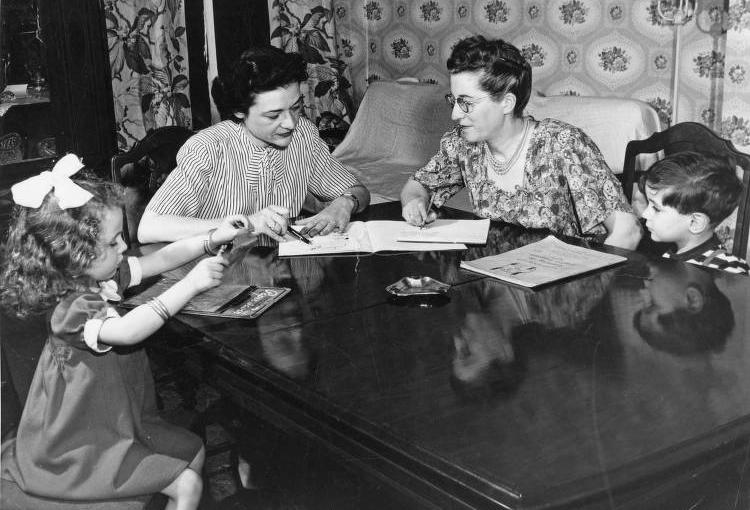Founded in 1893, the National Council of Jewish Women (NCJW) is the oldest volunteer Jewish women’s organization in the U.S. It has been at the forefront of social change locally and nationally.
In Indianapolis, the roots of the organization formed at the (IHC), the first Jewish congregation in the city. In 1896, members of an IHC women’s religious study group established an industrial school that trained young women in darning, patching, and sewing. In 1903, under the supervision of Rabbi , the group formally reorganized as the Indianapolis section of the Council, placing more emphasis on social service work, especially to meet the needs of immigrants from eastern Europe.
The goals of the NCJW always have embodied Jewish values and democratic principles by advocating for human welfare through volunteerism and participation in education, service, and advocacy programs. NCJW has sought to improve the lives of women, children, families, and older adults for more than a century. Over the years, the NCJW has developed programs that support Jews and non-Jews alike.
The Indianapolis Council has proved to be no exception. In its first decade of service, the Indianapolis NCJW developed playgrounds in the city to provide children an alternative to playing in the streets. The first playground was built at Indianapolis Public School No. 6 and monitored by NCJW volunteers. These volunteers estimated that more than 150 children used the playground weekly. In 1906, in conjunction with the , Indianapolis members agreed to act as juvenile court probation officers, overseeing all Jewish and some non-Jewish cases. During the first year, the local NCJW handled 14 cases; only six involved Jewish children.
At the turn of the 20th century, the Indianapolis council also furnished a cottage in the Tuberculosis Colony of . Forty years later, the Polio Committee helped administer polio immunizations in public schools. Other volunteers assisted patients at , a mental health facility, with gardening projects and provided the hospital with a bus for patient outings.
In 1920, NCJW started the first Milk Lunch Program in the public schools, as well as sight and hearing testing of school children. The local Council participated in these national programs to benefit the children of Indianapolis.
Support for immigrants remained a vital NCJW goal for many decades. Both before and after World War II, Indianapolis members helped to resettle Eastern European immigrants and provide guidance regarding American life and culture. During the 1930s, the women provided lunch money for refugee children and paid night school tuition for adults. In 1939, the Indianapolis council assisted in opening and managing a Refugees’ Handicraft Exchange where refugees could sell the products of their trade. Indianapolis members also organized the Home Institute to instruct married refugee women in child care, budgeting, cooking, and homemaking.

The NCJW has continually raised funds to support its projects through dues, donations, and bequests. In the 1950s, the Indianapolis Council operated a thrift shop. The popular Angel Ball originated in 1961 and was for many years a significant social and fundraising event for NCJW.
In 1968, the Indianapolis Section of the NCJW was selected by the national organization to carry out a pilot study for a “home-delivered” food program. had tried to initiate a similar program for cancer patients earlier, but ultimately the effort failed.
The NCJW intended the program to provide kosher meals to “persons unable to shop and prepare their own meals,” but in Indianapolis, it had grown into a citywide project by 1971. Known as Meals on Wheels to deliver food to home-bound older adults, , and the Commission on Aged and Aging funded the project. Meals on Wheels began with 6 clients and 10 volunteers and operated out of University Heights Hospital on the city’s southside. Indianapolis NCJW member Marge L. Jacobs served as the first president of the board of directors of Meals on Wheels and then was honorary chair until her death in 1997.
From the 1970s until the mid-2000s, Indianapolis members ran Collector’s Choice, a massive three-day sale of gently worn clothing. In the 1980s, the Displaced Homemaker Project assisted survivors of domestic violence at the Sojourner House. During the same time, with the increasing number of Jewish immigrants from the Soviet Union, the Indianapolis council reorganized its immigration efforts to help alleviate problems faced by the Soviet Jews.
Efforts to help children expanded at the end of the 20th and the beginning of the 21st centuries. In the 1990s, HIPPY (Home Instruction Program for Preschool Youngsters) began. Nearly 80 years after NCJW Indianapolis members agreed to act as juvenile court probation officers, the program developed into the Guardian Ad Litem for Kids program at Kids’ Voice of Indiana, which provides training of volunteers to represent the best interests of children in the court system.
Since the 2000s, the Indianapolis NCJW also has supported programs at and the , both of which serve survivors of personal abuse. In addition, NCJW partnered with the Julian Center to operate a boutique within Thrifty Threads, a resale shop, whose proceeds directly support women who are victims of domestic abuse. NCJW also continues to donate $50,000 annually in scholarships to Jewish teens, new Americans, and single parents.

Help improve this entry
Contribute information, offer corrections, suggest images.
You can also recommend new entries related to this topic.

